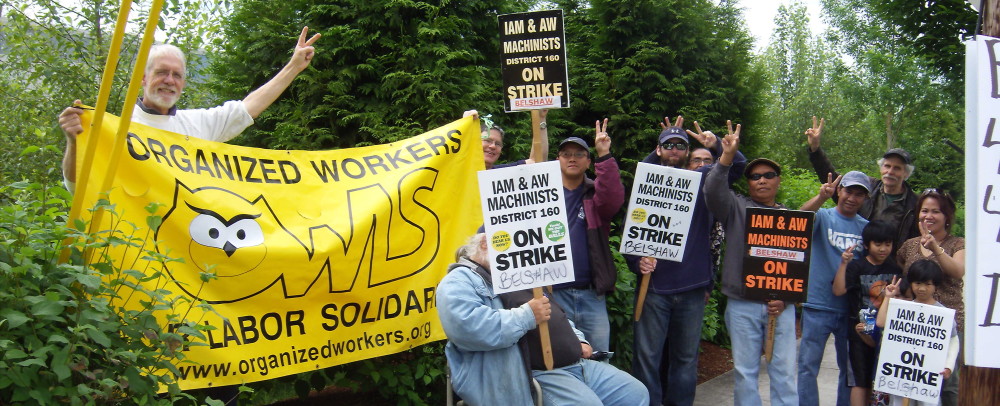On Tuesday, April 7, at 11:30am, public transit workers at King County/Metro will hold a virtual news conference calling for urgent measures needed to better shield transit workers and riders from COVID 19. The news conference will be via Zoom. OWLS will livestream the news conference on its facebook page at facebook.com/OrganizedWorkers
Transit workers will announce delivery of an Open Letter to King County Government, signed by more than 50 King County Metro transit workers. Supported by Organized Workers for Labor Solidarity (OWLS), bus, rail, and streetcar operators, mechanics, supervisors and custodians will tell their stories to underscore the urgency of their demands. It will begin with a remembrance of fallen bus drivers Scott Ryan and Jason Hargrove, both of whom died from COVID19 after expressing concern about a lack of safety measures on public transit.
The Open Letter includes calls for more transparent reporting of COVID19 cases to front line workers, reduced hours and hazard pay, full Personal Protective Equipment (PPE) and training for bus cleaners, custodians, operators and others whose jobs require frequent exposure to the coronavirus, and daily changing of bus filters.
OPEN LETTER
to King County Council, King County Executive Dow Constantine,
Metro General Manager Rob Gannon, and Metro Ombudsman
We, the undersigned transit workers at King County Metro, and members of Amalgamated Transit Union 587, call on King County government to immediately implement the following emergency measures to help contain the spread of coronavirus on our public transit system.
- Full transparency and disclosure of coronavirus cases in the workplace, throughout the system; Rescind the policy, stated in a March 23, 2020 General Manager’s Bulletin, that “unless the employee was symptomatic in the workplace, we are not providing notifications to immediate coworkers.” Equally unacceptable in the same bulletin is Metro’s stated policy that “we will not be announcing or addressing every new illness or positive case in the workplace.” This violates the most basic worker protections, and puts not only transit workers at unnecessary risk, but also the riders we are transporting.
- On a daily basis, clean, sanitize and change the filters of every bus that goes into service. Provide full Personal Protective Equipment (PPE) and safe practices training for all workers involved in cleaning buses. Because this virus is communicated primarily through respiratory droplets, clean air filter systems are fundamental to curbing the spread of COVID19. As well, to further protect riders and drivers, provide PPE to all transit operators for assisting riders with disabilities, when social distancing rules are not practicable. Guarantee access to handwashing stations and break times to use the stations.
- Institute hazard pay in the form of 40 hours pay for 30 hours work for all transit workers who are serving in harm’s way. Better distribution of work and less time on the job means less exposure, and less of the stress that can undermine workers’ immune systems. Provide full wages for all high-risk workers who are forced to stay at home and/or are caring for dependents, until it is safe to return to work.
Going into this crisis, King County Metro has failed to live up to its Equity and Social Justice Strategic Plan. Inequity, discrimination, and injustice have been allowed to thrive, while management remains immovable and indifferent, and even retaliates against employees who raise problems or concerns. This culture impairs safety under normal circumstances, and now has created a highly toxic work environment that jeopardizes the lives of workers and the riding public.
It is critical now, more than ever, that Metro management turns this around, listen to its front line workers, and step up and provide the basic elements of a safe environment for workers and riders. We are all in this together. We won’t be able to flatten the curve unless everyone does their part.
Respectfully,
Linda Averill, Streetcar Supervisor, Shop Steward; Cheryl Jones, East Base (EB) Part-time Transit Operator (PTTO); Mohammad Bazargan, North Base (NB) Full-time Transit Operator (FTTO), James Pratt, Component Supply Center (CSC) Mechanic; Todd Jader, CSC; Adam Arriaga, CSC Mechanic; Doug Frechin, NB PTTO, Shop Steward; Tim Wong, Equipment Service Worker (ESW) CSC; Julian Marquez, CSC Mechanic; Brian Cabera, CSC Mechanic; Lenneth Richard; Robert Bonina, Link Light Rail Operator (LLR), ATU 587 Executive Board Officer; Issiac Dickens, Streetcar Track Maintainer, shop steward; Stan Straker, Atlantic Base (AB) Mechanic, Shop Steward, Safety Committee member; Hassan Osman, NB FTTO, shop steward; Jose Rosado, South Base (SB) FTTO, shop steward, Tyrone Dumas, Streetcar Operator; Francis Lebel, Bellevue Base (BB); Karen Berry, TO, Lisa Randle, TO; Daryoush Hakki, Link Light Rail Supervisor; Brian St. Pierre, TO; Patricia Keels-Venable; Dionna Anderson, TO; David Elleby, TO; Thomas Nary Hayes,TO; Brenda Schwald, Streetcar Operator, shop steward; Juanita Baker, BB FTTO; Josey Woods, NB TO; Betty Park, SB TO; Nick Ryan, Ryerson Base (RB) TO; Arwin Apolonia, NB TO; Kathy McMahon; Aries Dial; JoAnn Oligario, CB FTTO; Rodolfo Franco, Streetcar Operator; Fredrick Coats, First-line Supervisor; Mary Montgomery, CB FTTO; Vlash Naidu, CB FTTO; Heidi Barack, AB FTTO; Michael Fox CB FTTO; Emily Paine, AB PTTO; Albert Galange, CB FTTO; Kahurangi Pere, Atlantic Base Safety Team, PTTO; Mary Buada RB FTTO; Stephanie Jacobs, CB; Mike Cannon, CB FTTO; Ed Duncan, NB FTTO; Tanisha Labossiere; Juan G. Hood III, Facilities Custodian Shop Steward.
# # #
